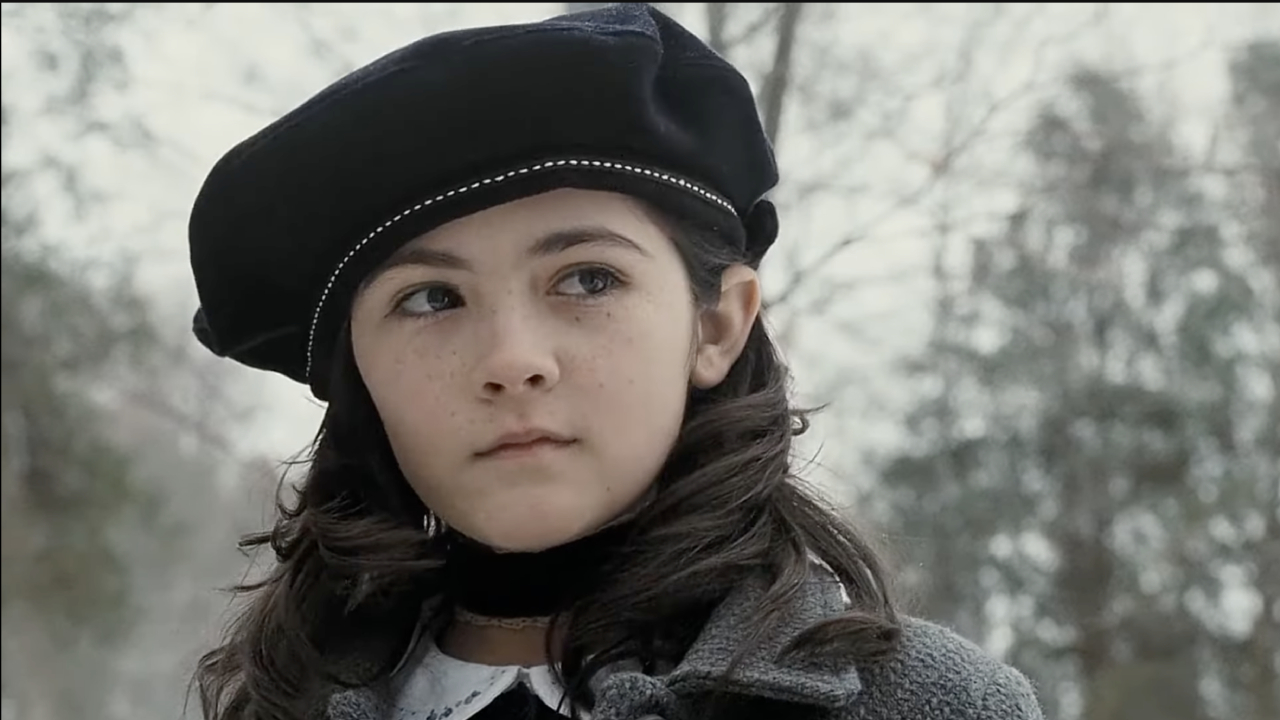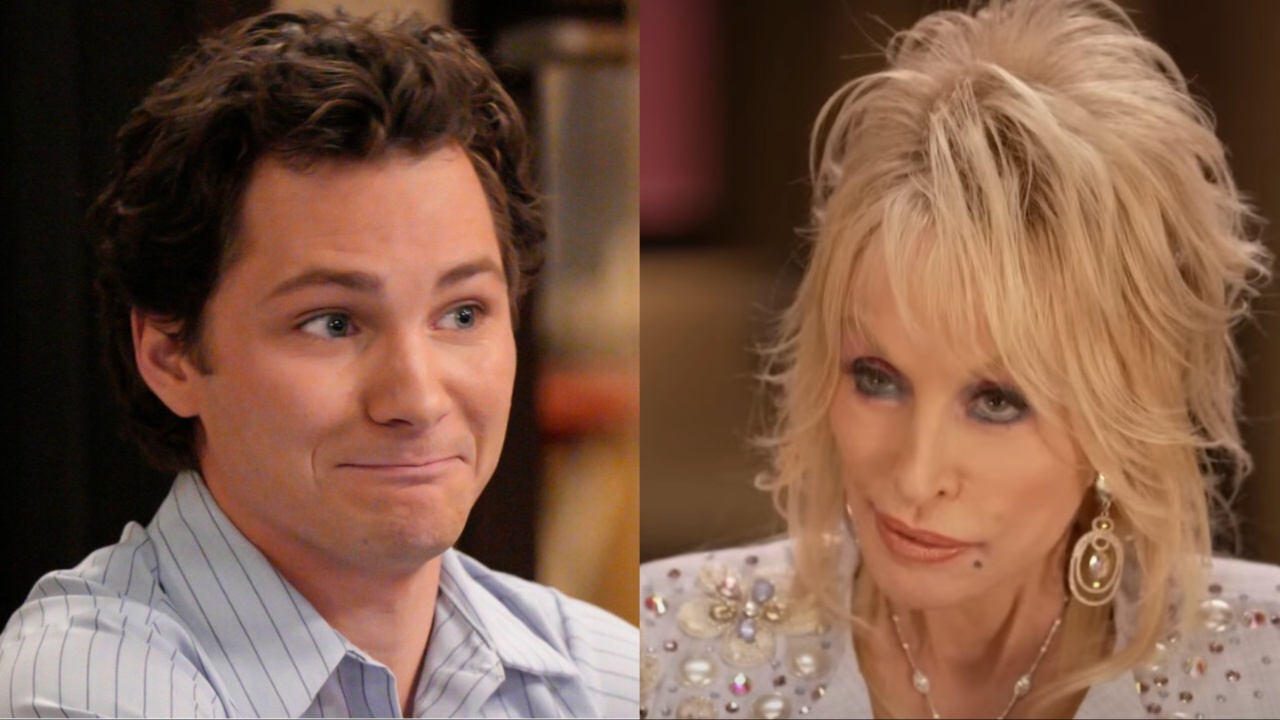Adapting Stephen King's The Running Man: Is 1987's Arnold Schwarzenegger Movie The Least 'Stephen King' Stephen King Film?
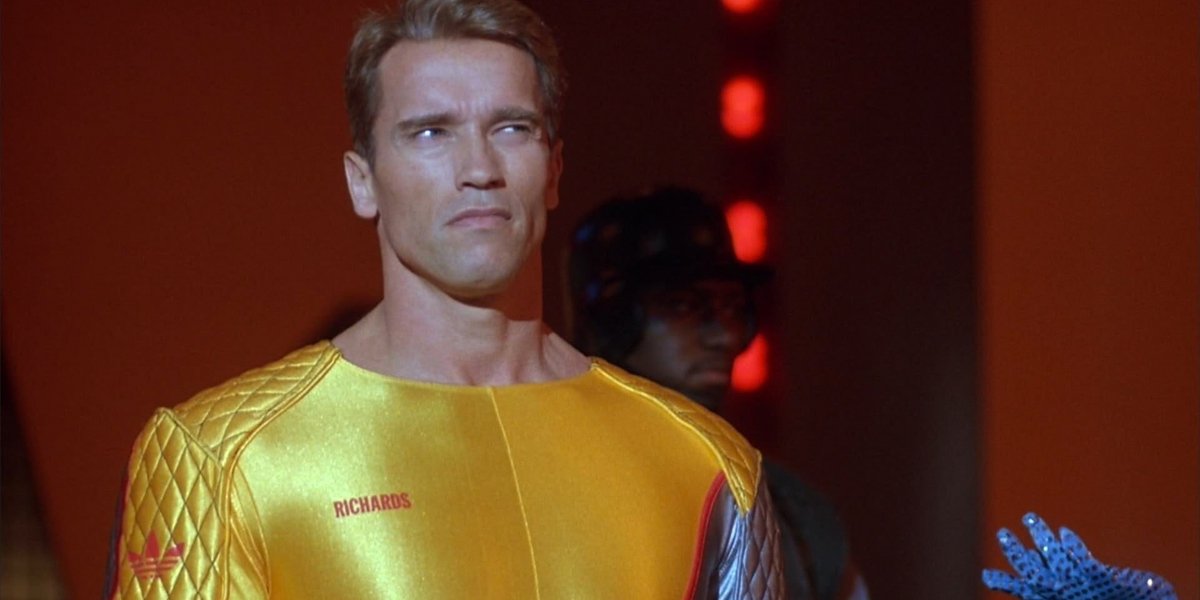
Richard Bachman was born in New York, and spent nearly a decade-and-a-half of his life in the military. He eventually moved to New Hampshire and began running a dairy farm as his day job. He had a wife, Claudia Inez Bachman, and his family was struck by tragedy when his six-year-old son fell in a well and drowned. His true passion was writing, and before his death in February 1985 he had five books published. He is also 100 percent fictional.
Stephen King created “Richard Bachman” in the late 1970s, and it was in part because his publishers didn’t want to release books as fast as he could write them, but also because of a kind of professional identity crisis. As he describes in the essay “Why I Was Bachman,” he found himself curious if his reputation as a best-selling author had begun to eclipse the substance of his work. An experiment was launched in 1977 with the paperback release of Rage, a novel he began writing when he was still in high school, and it ended in 1985 when King confessed to the pen name, and Bachman subsequently died of cancer of the pseudonym.
In terms of the professional identity crisis side of things, the experiment didn’t yield much in the way of affirming results, as none of the Richard Bachman paperbacks ended up selling in quantities analogous to the novels sold with the author’s real name (King admits he hampered sales by requesting that the releases be “low profile”). That being said, one way in which the work was comparable is in the fact that it still inspired Hollywood to come calling, as producer Rob Cohen purchased the film rights to 1982’s The Running Man without knowing the true identity of the author.
By the time Paul Michael Glaser’s The Running Man hit the big screen in November 1987, every Constant Reader knew that Stephen King was Richard Bachman – and yet it is ultimately fitting that there is a strong argument to be made that it is the least “Stephen King” Stephen King movie. As such, it makes for fascinating dissection, both in comparing it to the source material and examining how it’s been treated by time, and you’ll find both in this latest edition of Adapting Stephen King.
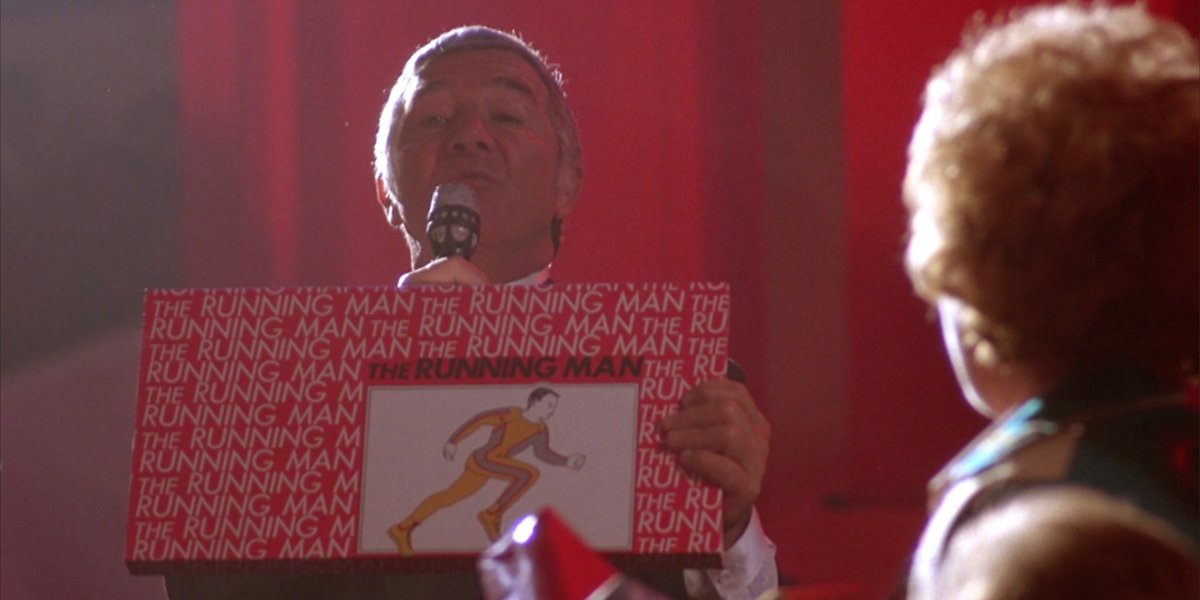
What The Running Man Is About
It’s hard for any writer not to be at least somewhat jealous of Stephen King and the endless font of creativity that is his brain, but it’s stories like the origins of The Running Man that cause one’s skin to start turning a dark shade of emerald.
Stanley Wiater, Christopher Golden, and Hank Wagner’s The Complete Stephen King Universe dates the origins of The Running Man to 1971, shortly after Stephen King completed the original draft of what would become his first published novel: Carrie. The author was struck by the concept for the dystopia-set book, and when he started committing it to paper he practically didn’t stop until it was done. He completed it in about 72 hours, and “Why I Was Bachman” adds the detail that it was printed “with virtually no changes.”
Set in the spectacularly bleak and now-not-too-distant-future of 2025, The Running Man is the tale of Ben Richards – whom we meet at a point of desperation. His abrasiveness toward authority has resulted in him being unemployed and blackballed, but he needs money so that he can get medicine for his sick baby daughter and avoid his wife resorting to work as a prostitute. With no other options available to him, he opts to become a volunteer for the Network, what has ostensibly become the propaganda arm of the government, and become a contestant on one of the nation’s popular game shows.
CINEMABLEND NEWSLETTER
Your Daily Blend of Entertainment News
There are a number of different games that are broadcast, including Treadmill To Bucks, How Hot Can You Take It, and Swim The Crocodiles, but the flagship show is The Running Man: a series that sees contestants become the subject of a nationwide manhunt that ends when they are found and killed. One hundred New Dollars is rewarded to surviving families for each hour the competitor remains alive, but if they survive for 30 days they win the Grand Prize: freedom and one billion New Dollars.
Ben Richards is selected as the newest contender on The Running Man, and he is given a 12-hours head start to go into hiding while all kinds of lies are spun to the public about him having a criminal and psychotic past – meant to inspire viewers to rat him out if they spot him. Wearing disguises, avoiding the hired Hunters, and discovering allies along the way, he makes his way across the Northeast, all the while learning about the covert ways in which the rich upper class in the bifurcated society are both literally and figuratively poisoning the lower class.
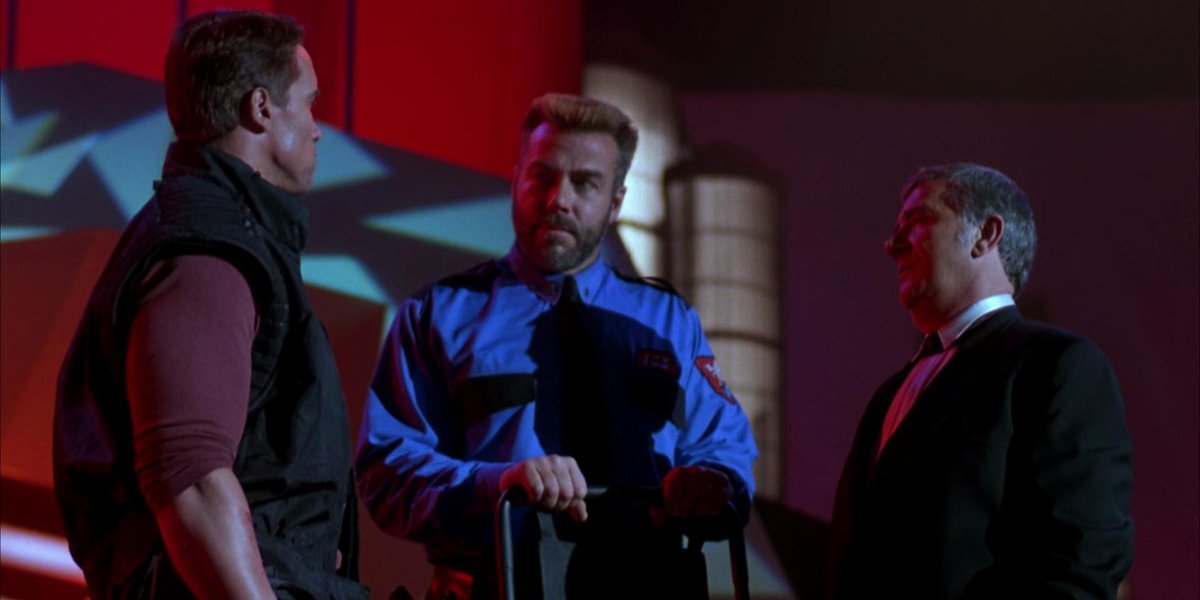
How Paul Michael Glaser’s The Running Man Differs From Stephen King’s Book
In Paul Michael Glaser’s The Running Man, the protagonist is named Ben Richards (played by Arnold Schwarzenegger), the antagonist is named Killian (Richard Dawson), and the plot is set in a dystopian future where a game show has contestants risk their lives for the entertainment of the masses. That, however, is basically all that is shared in common between the Stephen King book and the adaptation.
Because of this, listing out all of the deviations made by The Running Man movie would result in a column that is as long as the novel – so I will instead focus in on the three most substantial elements that change the profile of the material: the personality and perspective of Ben Richards, the tone, and the ending.
In its development, The Running Man ended up going through multiple directors, but two key pieces that remained in place nearly from the beginning were screenwriter Steven E. de Souza and Arnold Schwarzenegger. It was actually the former who was instrumental in getting the latter involved, as the two men had previously collaborated on 1985’s Commando, but once the star was attached, the idea of making a movie even remotely similar to Stephen King’s book went out the window.
In the featurette “Back To Bachman: Steven E. de Souza Remembers The Running Man,” the screenwriter recalls that he never actually gave Arnold Schwarzenegger a copy of the novel when he was pitching him on the project, and the reason is because it would have been needless. From circumstance, to background, to personality, there is zero overlap between the two incarnations of Ben Richards, and so the actor would have gotten nothing out of the material that would have aided his performance.
Stephen King’s Ben Richards is a hard case with zero fucks to give beyond providing his family with what they need to survive, and Arnold Schwarzenegger’s Ben Richards is… Arnold Schwarzenegger. The Running Man is a showcase for some of the star’s best cinematic one-liners, including one of his iconic “I’ll be back” deliveries, but there isn’t a single one of them that would be uttered by the original version of the character.
Turning the protagonist into a charismatic, muscle-bound hero fed into Steven E. de Souza ramping up the camp factor in the movie, which, again, is something that is non-existent in the Richard Bachman text. Both versions are satire, but the blockbuster movie is cartoonish satire – replete with garish yellow-and-blue spandex costumes, and “Stalkers” who are outfitted like hybrids of professional wrestlers and comic book supervillains. It’s a stark contrast to its inspiration, which is as grim and grisly as Stephen King stories get.
There is no better illustration of this extreme deviation in tone than in comparing what happens in the respective endings of The Running Man on page and screen. As written by King, Ben Richards successfully hijacks a plane with a hostage and a bluff about having explosives, but when he learns that his wife and child have been killed, he decides to fly directly into the Network headquarters so that he can try and kill as many executives as he can, including Killian (a conclusion disturbingly reminiscent of events on September 11).
Meanwhile, the film ends with Schwarzenegger’s Richards sending Killian to a solo fiery death via rocket sled, delivering the one-liner “Well, that hit the spot,” and planting a big kiss on Maria Conchita Alonso’s Amber Mendez.
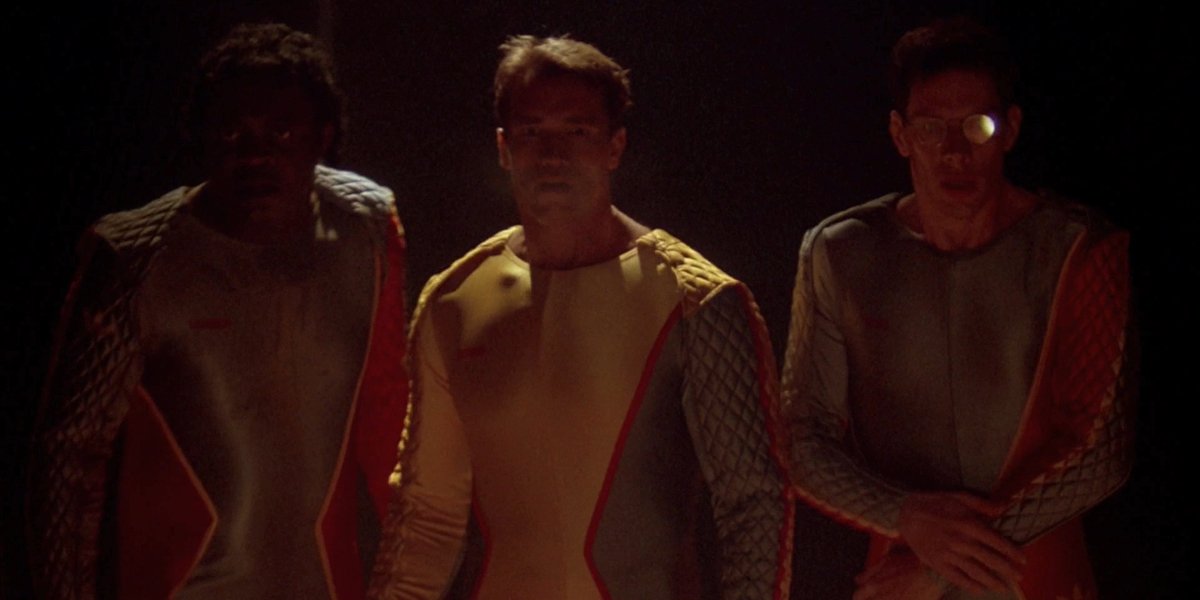
Is It Worthy Of The King
The Running Man adaptation came spectacularly close to being a total disaster. The film went through three different directors during its development, and while production actually started with Andrew Davis at the helm, that didn’t quite work out. As remembered by Rob Cohen on the Blu-ray commentary track, the movie was $8 million over budget and four days behind schedule just a little over a week into shooting, when dailies weren’t cutting together the producer had to let Davis go.
Paul Michael Glaser, who is best known for playing David Michael Starsky on the series Starsky & Hutch, was brought in to replace Davis, as Cohen had previously worked with Glaser making episodes of Miami Vice. With budget and time constraints being exceptionally tight, filming had to continue without reshooting the existing material, and Steven E. de Souza continued working on the script as production continued.
Usually this is the kind of behind-the-scenes chaos you learn about movies that wind up being total disasters – but The Running Man is a feature that, all things considered, is a fun piece of entertainment. There is a deep self-awareness to it that lets it float (not unlike Maximum Overdrive), and it can easily get its hooks into you if you can be on board with a secondary antagonist who is covered with LED bulbs, shoots lightning, and sings opera. Casting Richard Dawson, best known for being the host of Family Feud, is an inspired choice, as his Killian is the exact kind of smarmy and sinister the movie needs.
Most significantly, it has Arnold Schwarzenegger at the height of his powers and at his most charismatic, and it is a film that is perfectly slotted alongside other 1980s Arnold classics like the aforementioned Commando, The Terminator, and Predator.
It’s the least “Stephen King” Stephen King movie, however, because 1980s Arnold Schwarzenegger is everything that King protagonists aren’t. The tension and horror in the author’s stories come from pathos and the personal understanding of what the characters are experiencing, even when said experiences get extreme and supernatural. The novel’s Ben Richards is a hungry, strong member of the working class who has been crushed by society – but Schwarzenegger’s Ben Richards can’t be crushed by society because he can just bench press it.
The film is very much a product of its era, but what has helped The Running Man age gracefully is that changes in our world since both the book and the movie were released have proven the subject matter shockingly prescient. Reality television hasn’t quite gotten to the point where contestants are facing fatal circumstances, but our society is just as hooked on the material as the one depicted in this adaptation. Furthermore, one can’t ignore the ever fertile ground in science-fiction that is bubbling class warfare, and while The Running Man is messy in its depiction, it does fit with the broader themes of Stephen King’s story.
The 1987 Paul Michael Glaser movie is really best viewed independently from its source material, but in the context of this column, that brings up a larger point: The Running Man is a book dying for a remake. It was reported in February 2021 that director Edgar Wright is now developing a new adaptation that will be much more faithful to Stephen King’s book, so I’m now just keeping my fingers crossed that it will come together.
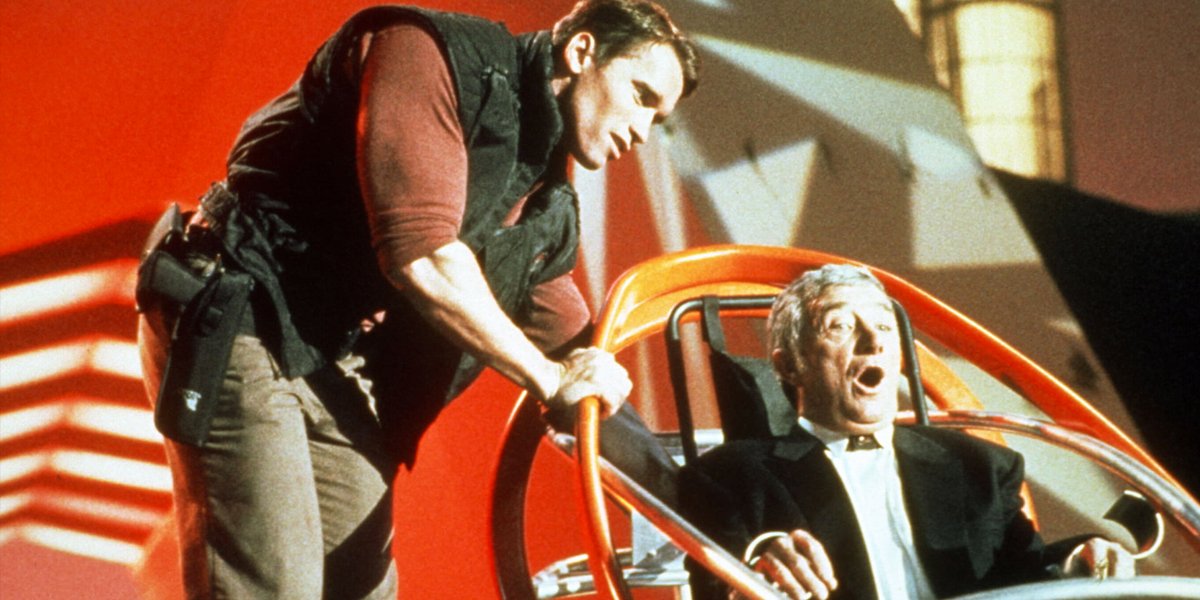
How To Watch Paul Michael Glaser’s The Running Man
If you’re like me and are constantly perusing the creation of the ultimate Stephen King collection, the best domestic physical version of The Running Man is the 2010 Blu-ray that was released by Lionsgate Home Entertainment (if you have a Region Free player, you may also want to consider the special edition from Germany, which includes a number of extra featurettes from 2018 in addition to everything the Region A release has). The movie is additionally available to rent or purchase digitally on all major platforms, and you can stream it with a Cinemax Go subscription.
Following the Arnold Schwarzenegger action of The Running Man, next week’s Adapting Stephen King will take a nice long look at the first big screen version of what many consider to be the author’s most horrifying novel: Mary Lambert’s 1989 film Pet Sematary. Look for the feature here on CinemaBlend next Wednesday, and in the meantime click through using the banners below to discover all of the previous installments of this column.







Eric Eisenberg is the Assistant Managing Editor at CinemaBlend. After graduating Boston University and earning a bachelor’s degree in journalism, he took a part-time job as a staff writer for CinemaBlend, and after six months was offered the opportunity to move to Los Angeles and take on a newly created West Coast Editor position. Over a decade later, he's continuing to advance his interests and expertise. In addition to conducting filmmaker interviews and contributing to the news and feature content of the site, Eric also oversees the Movie Reviews section, writes the the weekend box office report (published Sundays), and is the site's resident Stephen King expert. He has two King-related columns.



